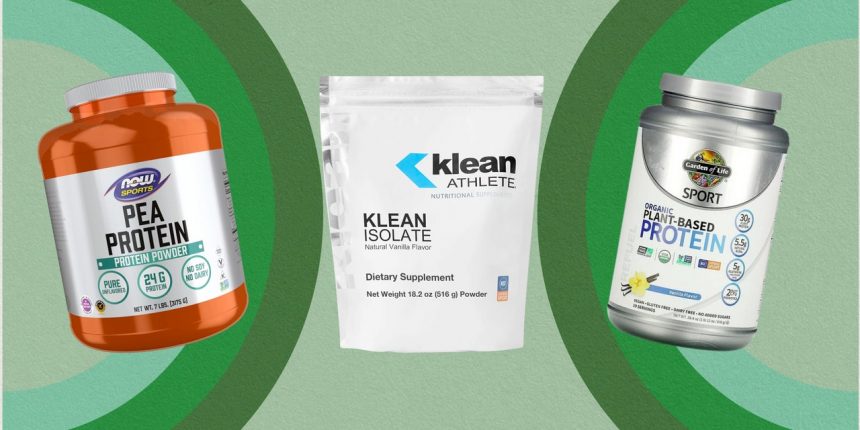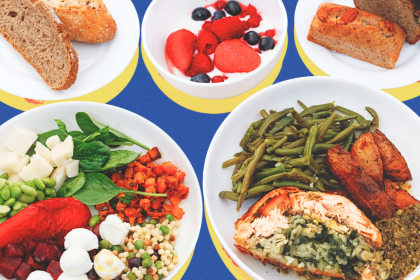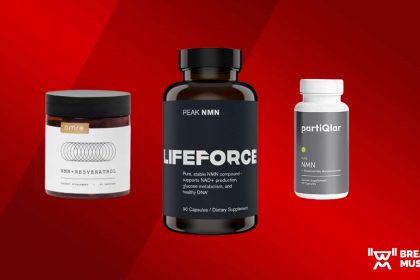Whey is also generally easy to absorb and digest, provided you don’t have a dairy allergy or lactose intolerance, Asche says. (If you’re specifically concerned about lactose, look for powders made with “whey protein isolate” as opposed to “whey protein concentrate,” since, as SELF has previously reported, isolate forms contain next to no lactose.)
Casein
Casein protein is similar to whey, since it also comes from curdled milk. But casein is made from the curd itself, rather than the liquid, and is dehydrated and processed into powder.
Egg white
Egg white protein powder comes from eggs. It’s dairy-free but not vegan, so is a great option for folks who avoid dairy but haven’t sworn off all animal products. Heads up, though: Some of our reviewers don’t love the taste or smell. Don’t rule it out for boosting your baking or smoothies, though.
Plant-based
If you’re vegan, dairy-intolerant, or prefer to eat fewer animal-derived foods, you likely want a plant-based protein powder. The most common options include protein derived from peas, beans, brown rice, and soy. Just keep in mind that certain plant protein sources are considered “incomplete,” says Asche, which is why a lot of these types of powders combine multiple protein sources, which can create a complete profile. Pea protein powder is considered a complete protein that contains all nine essential amino acids, so Feller recommends it for vegan diets.
How to choose the best protein powder
After you pick the best type of protein for you, you want to make sure your powder of choice fits your taste and budget. Here’s what to consider:
Price
When we’re sizing up products, we compare price per serving rather than the overall price. Prices on this list range from $.67 to $2.65 per serving, with the average being about $1.65, which we think is a good spot to aim for if you’re looking for a fairly priced protein powder.
Taste
Okay here’s an obvious one, but you’ve got to pick a protein powder you actually like. Do you want a desserty flavor to satisfy your sweet tooth, or something fresh and fruity to wake up your palette?
When picking a flavor, you should also consider how you plan to use the powder. For instance, if you’re a smoothie person, consider the taste that works with your favorite blend; and if you’re looking to incorporate the supplement into your baking, unflavored might be the best for you. Be sure to also check ingredient lists for any additional sweeteners or additives that might affect the taste.
How we chose the best protein powders
In addition to our experts’ input and recommendations, here are some key components our testers considered that factored into our picks.
- Protein source: Whether a powder uses an animal-based protein source (like whey) or one made from plants is a personal preference, but we prioritized options with a complete protein profile, meaning they contain all nine of the essential amino acids that your body needs to function.
- Third-party certification: Third-party certifications like Informed Choice for Sport Certified and National Sanitation Foundation (NSF) Certified for Sport ensure products include the ingredients their labels claim, and at the specified amount—and also that they don’t contain anything unlisted, like unsafe contaminants.
- Sweeteners: This is another matter of personal preference, but some artificial sweeteners and sugar substitutes can cause digestive issues, so we’ve highlighted where they’re used.
- Texture: No one wants a gritty, sandy smoothie. So SELF’s testers share how each powder shakes out (wink) to ensure we select powders that blend well.
- Packaging: An enormous tub of protein powder will always take up a ton of room in your pantry; but a resealable pouch can scrunch down as you make your way through the bag, which can be a perk if you’re short on storage space.
Who is protein powder good for?
Protein is essential for everyone, and powders can be an effective way to make sure you’re getting the right amount each day. The current recommended daily amount is 0.8 grams of protein per kilogram of body weight (or 0.36 grams per pound). Keep in mind, that amount of protein is the average minimum to prevent deficiency—if you’re an active person, you may want to shoot for closer to 1.4 to 2 grams per kilogram (or 0.64 to 0.91 grams per pound), Jones says. If you’re not sure how much protein you actually need, it’s best you speak to a nutrition professional.
FAQs
TL;DR? We get that sometimes you just want fast facts to help you make a quick choice. With that in mind, here are the answers to some of the most frequently asked questions about picking the best protein powders for your dietary needs and lifestyle.
Are protein powders healthy?
You betcha. Studies show that protein powders can help with muscle gain, workout recovery, and are a source of nutritional minerals. Just be sure to use them as directed, because research also points to a connection between (excessive) protein overconsumption and kidney issues.
How much protein powder should I take?
Studies show that 20 to 30 grams of protein in the form of protein powder supplementation per day could increase muscle protein synthesis (but this can vary based on your health and activity level). Most protein powders come in serving sizes around that range, so one scoop should be enough. It’s always a good idea to get your health-care provider’s input before changing your supplement intake.
Is it okay to take protein powder every day?
Protein powder is generally safe to use every day. However, Feller mentions that “you have to really look at that ingredient label and read the nutrition facts,” so you’re aware of any additives or ingredients like sugar or artificial sweeteners that you may want to limit in your diet. Again, it’s smart to have a health-care provider rubber-stamp your protein routine.
What is the best way to consume protein powder?
Most people mix protein powders with milk, water, or into a smoothie, but Feller says there are other ways to consume it. “You can bake with it,” she says, adding she sometimes incorporates it into recipes in place of flour.
When’s the best time to consume protein powder?
The best time to drink a protein shake is actually pretty subjective. Jones says it’s most beneficial when you don’t have bandwidth to whip up a whole food source of protein, whether that’s for breakfast or after your workout. Asche echoes this recommendation, saying you don’t have to overthink it: “It matters more about how much total protein you consume throughout your day as a whole, versus the timing.”
Related Reading:







